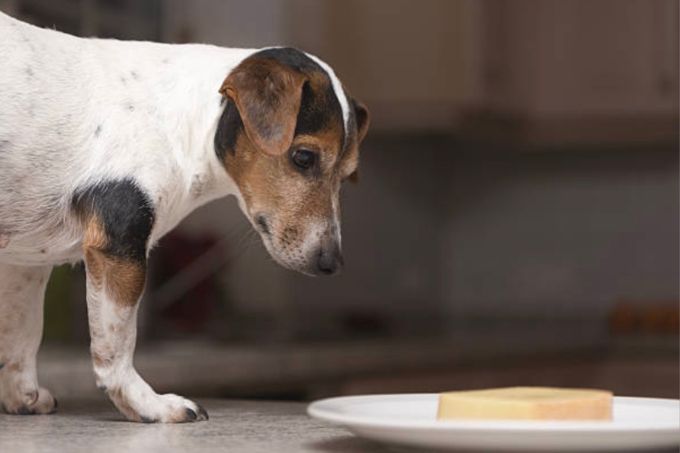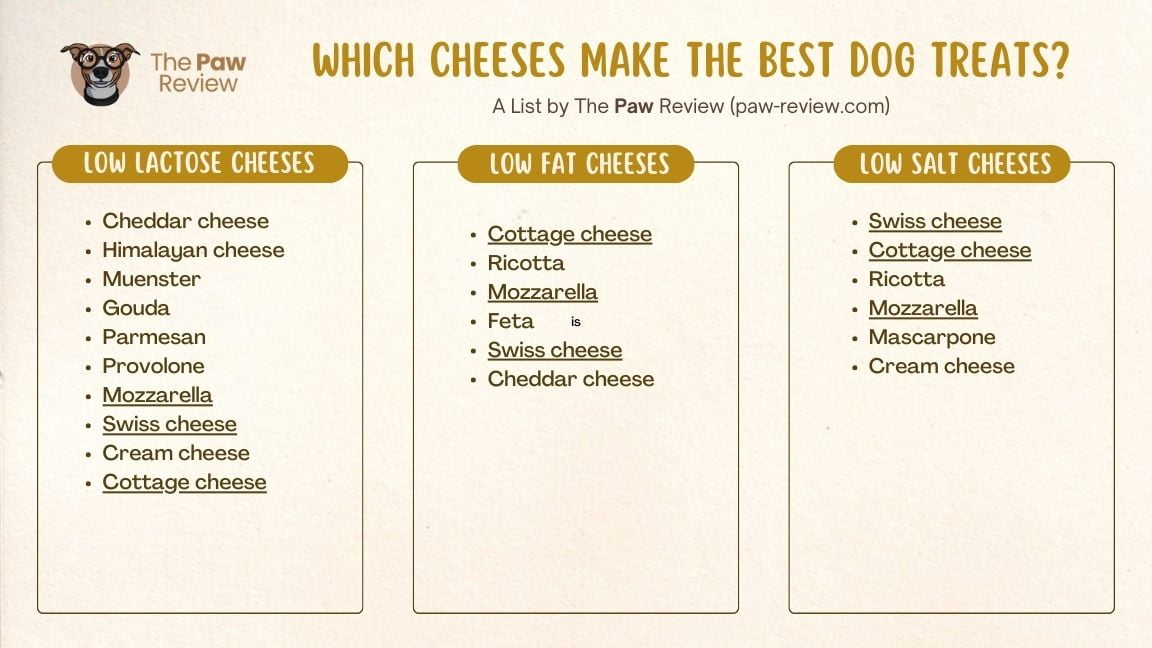This post may contain affiliate links, which means we may receive a commission from purchases made through these links. See our affiliate disclaimer.

Can dogs eat cheese? Is cheese bad for dogs? If these are the questions you’re looking to get answered, you’ve come to the right place.
Below, we answer these questions for you, plus some additional information — the benefits of cheese for dogs, the best (and worst) cheeses to give your dog, and how much cheese is enough.
Can dogs eat cheese?
The short answer: Yes, dog can eat cheese, but only in small amounts. Cheese is not toxic to dogs, and actually has some healthy nutrients.
Benefits of cheese
Cheese is a good source of protein, minerals (calcium, magnesium, zinc, phosphorus) and vitamins (vitamin A, vitamin B2 & B12, vitamin D). It’s also low in carbohydrates & fiber, but generally high in fat. Certain types of cheese may have high levels of a healthy fat known as conjugated linoleic acid.
These nutrients help keep bones strong, may lower blood pressure & improve gut health. Cheese can also be used as a reward in dog training, or as an alternative to peanut butter for hiding your dog’s pills in.
How much cheese can you give your dog?
How much cheese your dog can safely tolerate depends on how big or small your dog is. However, in general, cheese should be given sparingly & infrequently — we recommend using cheese an occasional treat for special occasions, rather than making it a regular part of your dog’s diet.
As a rough guide, we advise portioning cheese into 1/4 or 1/2 inch square pieces, and giving no more than the following amounts:
If you notice your dog not tolerating the cheese very well, pull back on the amount of cheese, or stop it altogether.
The signs & symptoms you’re watching out for are: gassiness & flatulence, soft stools, and abdominal upset. Mild symptoms that pass quickly are fine, but symptoms that persist or are severe will require more attention.
Can puppies eat cheese?
Yes, puppies can eat cheese! Cheese is not toxic for puppies, and can be given as a special treat.
Treats in general should make up no more than 10% of any dog or puppy’s diet, and cheese should be an occasional treat only.
When dogs should NOT eat cheese
Dogs that are obese or diabetic should avoid cheese. Cheese is high in fats & salt content, making it a calorie-dense food. Dogs that are trying to lose weight or watch their total calorie intake should generally avoid all calorie-dense foods.
Dogs that are lactose intolerant should avoid cheese. While not all dogs are lactose intolerant, most actually are. But not all types of cheese contain lactose! We go into further detail on this in the section below.
Best cheeses for dogs to eat

The short version: Mozzarella, Cottage cheese & Swiss cheese are safe for dogs and are also low lactose, low fat & low salt cheeses — just be mindful to stick to the intended serving size of 1 ounce (~28 grams).
Low lactose cheeses that are safe for dogs
The cheeses above are all low in lactose, and listed roughly in order, from lowest to increasing amount of lactose. Cheddar cheese & Himalayan cheese both have near-zero amounts of lactose. The other cheeses mentioned all have relatively low lactose content, at the intended serving size of one ounce (~28 grams).
Yogurt and sour cream are also quite low in lactose content; while not cheeses, they can make very tasty dairy treats.
Low fat cheeses that are safe for dogs
Cream cheese & Ricotta are the lowest fat cheeses that are safe for dogs. The other cheeses listed above are also relatively low in fat, plus reduced fat versions of many other popular cheeses are easy to find at groceries these days.
For dogs that are obese or diabetic, and trying to lose weight, we recommend the above low fat cheeses given only sparingly and occasionally.
Low salt cheeses that are safe for dogs
Swiss cheese & cottage cheese are among the lowest salt cheeses that are safe for dogs. The other cheeses on the list above also have relatively low amounts of salt, but do make sure to buy the plain/unsalted versions.
For dogs that have high blood pressure, we recommend the above low salt cheeses given only sparingly and occasionally.
Worst cheese for dogs to eat
Blue cheese is not safe for dogs to consume. Blue cheese is unique in that it contains a fungus that gives it a distinct marbled look. This same fungus, known as Roquefortine C, is toxic for dogs.
Any cheese with added herbs, seasonings or spices is unsafe for dogs. Cheeses without any additional flavoring is already an excellent creamy treat for dogs. Some flavorings that are common in cheeses — such as salt, garlic or spices — are known to be harmful to dogs.
Frequently asked questions
Yes, dogs can eat cottage cheese. Cottage cheese is an excellent choice of cheese for dogs. Cottage cheese is low in lactose, fat & salt, and is one of our recommended cheeses for dogs.
Yes, dogs can eat cream cheese. However, we recommend moderated amounts of cream cheese for dogs, as it has a high amount of fat.
Yes, dogs can eat Mozzarella cheese. Mozzarella is an excellent choice of treats for dogs, as it has low lactose, low fat and low salt contents. Mozzarella is one of our recommended cheeses for dogs.
No, dogs should not eat mac and cheese. While mac and cheese is not toxic to dogs, it contains a lot of ingredients that may cause gastrointestinal problems — such as dairy & gluten. Onion & garlic, both common seasonings in mac and cheese are toxic to dogs.
No, dogs cannot eat blue cheese. Blue cheese contains a mycotoxin called Roquefortine C that is poisonous to dogs.
Danish blue, Roquefort, Gorgonzola, Stilton and Cabrales are all blue cheeses, and all of these are dangerous for dogs.
Yes, dogs can eat feta cheese. However, we recommend moderated amounts of feta cheese for dogs, as it has a high amount of salt.
Yes, dogs can eat American cheese. However, we recommend sparing amounts of American cheese for dogs, as it has high amounts of fat and salt.
Yes, dogs can eat Cheese Puffs, however we don’t recommend it for dogs. Cheese puffs, and other similar products, have high amounts of salt, fat and preservatives.

